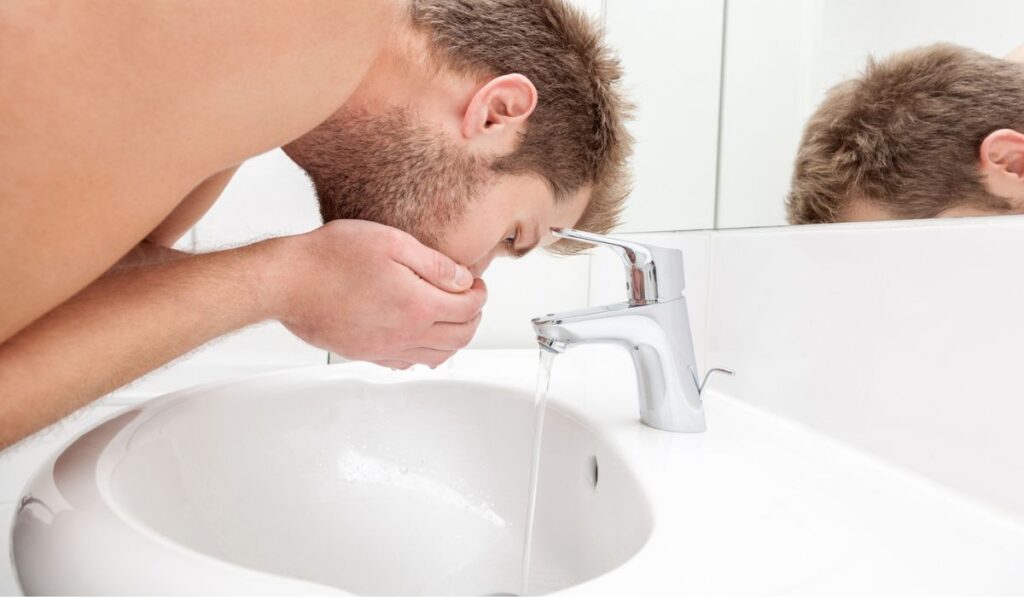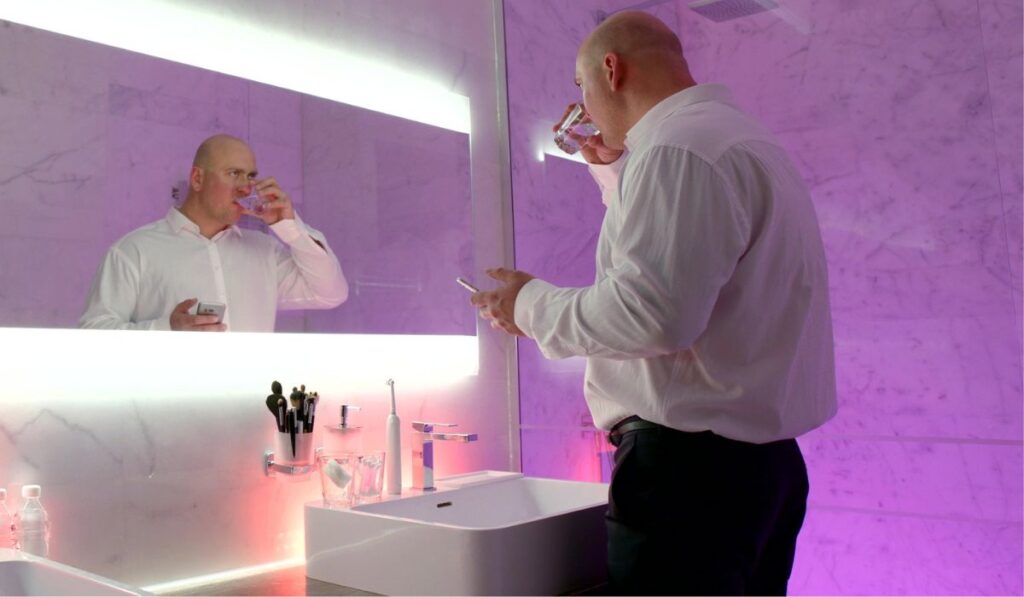If you’ve ever woken up feeling parched in the middle of the night, you know how far away the kitchen sink can seem in that half-asleep, half-awake state. The nearest place to quickly quench your thirst is likely to be the bathroom. But is it safe to drink from the bathroom sink?
Drinking water from the bathroom is generally safe as long as tap water in your area is deemed potable. Water quality is the same throughout the house, in most cases. However, keep in mind that any filters you may have in the kitchen won’t be present in the bathroom.
Let’s take a closer look at whether there are any differences between water from the kitchen and bathroom sinks as well as any safety concerns you need to keep in mind. Next time you need a cup of water, you’ll know exactly where to go.
Is Bathroom Tap Water Safe to Drink?

Ultimately, drinking bathroom tap water is as safe as drinking from any other water source in your home. So, as long as your kitchen water is safe to drink, the bathroom water should be fine as well.
That said, there are risks that come with drinking tap water, regardless of where it comes out. Research shows that each time you enjoy a glass of tap water, you could be taking in a very low dose of other people’s medication unintentionally.
Small amounts of pharmaceuticals, including antibiotics, mood stabilizers, sex hormones, anti-seizure compounds, and other drugs, are present in the water supplied to over 40 million homes across the US.
According to a five-month investigation by the Associated Press, the drugs get into the drinking water supply in several ways. Some people flush medication down the toilets. It could also be from the urine or feces of people who take medicine, absorb some and pass the rest out.
The investigation indicated that these pharmaceuticals remain in the water even after treatment and cleansing by water treatment plants. Eventually, a portion of these drugs (in very low doses) re-enters the domestic supply, and we end up consuming them.
The levels are so low that they have to be measured in parts per billion or even trillion, and water companies insist these concentrations are safe. However, scientists contend that ingesting so many prescription drugs and over-the-counter medicines, even in tiny amounts, could have serious long-term effects.
If your water or piping system is a bit older, you could be consuming little bits of lead with your water. Lead poisoning could lead to serious health problems, including nerve damage, diarrhea, memory loss, and muscle cramps. If you suspect that your water is contaminated with lead, you may want to reconsider drinking it.
Is Bathroom Water the Same as Kitchen Water?
Technically, all the water in your house comes from the same source — the water mains, in most cases. No matter where the water comes out, be it the kitchen or bathroom, its chemical composition is the same.
However, contaminants in the groundwater, such as lead from old piping, pesticides, and coliform bacteria, could affect the overall quality of water. These contaminants add other molecules like lead and carbon-filled organic compounds, decreasing water quality.
Generally, modern homes source their groundwater from the main water supply of the city or town they’re in. The water gets in through pipelines around the house, which are often similar in the kitchen and bathroom. Therefore, the water quality is the same all through the house.
While there are numerous debates that some pipelines are different in the kitchen and bathroom in some houses, the homeowner’s plumber is the best person to ask about the home’s plumbing system.
Why Does Bathroom Tap Water Taste Different?

If you’ve ever drank water from your bathroom tap, you may have noticed it tastes slightly different from kitchen water and is often slightly warmer. Here’s why:
Old Pipes
The weird taste in your bathroom tap water could be from your plumbing, particularly from stagnant and warm water through parts of your pipes that haven’t been around for a long time.
Old and corroding copper or zinc pipework could also lead to a funny taste in your water. Moreover, the pipes may contain dirt and debris, which may affect the water flowing through.
Water Filters
Water filters may be the most common source of flavor in tap water. Your bathroom water may taste like chlorine because many systems use chlorine to filter their water supply. Smaller systems primarily use chlorine because it’s less expensive compared to other options, such as ozonation — using ozone to filter water.
Chlorine is present in tiny amounts in treated water and is safe to drink in such small concentrations but inevitably makes the water taste different.
Bacteria
Bacteria in your water system, which occur naturally due to the decay of organic material, could make your bathroom tap water taste or smell terrible. However, water agencies don’t consider this issue a major cause of concern.
Seasonal Water Quality Effects
It’s difficult for water companies to prevent the change in water quality at certain times of the year. During the summer, rivers may take on a musty or earthy smell that can sometimes transfer to your tap water as treatment isn’t working optimally during hot weather.
Algae blooms in the water source could also mess with the taste and smell, and while the water company can deal with the issue often by running the water through a filter, it isn’t usually harmful.
Plumbing
In some houses, the plumbing is a bit different. Kitchens usually source their water from mains ( the municipal district that delivers fresh water into the building) but the bathroom could be getting its water from storage tanks.
If your bathroom tap water tastes different, your best bet is to have a professional inspect your water system and install a filtration system. Otherwise, your next drink from the bathroom may make you sick.
